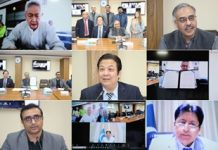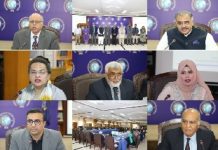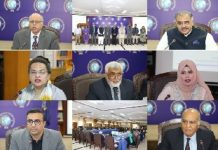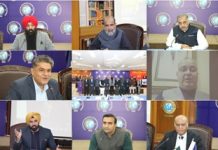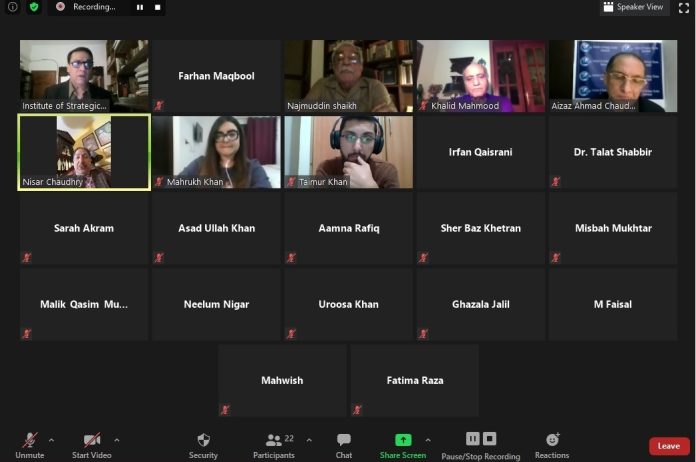Press Release
Web Panel Discussion
Future Directions of Pakistan-US Relations Post US Elections 2020
November 12, 2020
The Centre for Strategic Perspective (CSP) at the Institute of Strategic Studies Islamabad (ISSI) organized a web panel discussion on “Future Directions of Pakistan-US Relations Post US Elections 2020.” The panel of experts included: Ambassador Najmuddin Shaikh, former foreign secretary of Pakistan; Dr. Nisar Chaudhry, a Pakistani American affiliated with the State Department; Dr. Irfan Qaisrani, Professor, Department of Humanities and Social Sciences, Bahria University, and Mahrukh Khan Research Fellow, CSP-ISSI. Ambassador Aizaz Ahmad Chaudhry, Director General ISSI, and Ambassador Khalid Mahmood, Chairman BoG, ISSI also joined the panel for the discussion.
Director CSP and Editor at ISSI Mr. Najam Rafique opened the panel discussion. Introducing the subject for discussion, he said that as Joe Biden walks into the White House on January 20, 2021 as the 46th President of the US, he will be faced with a series of daunting challenges, both at the domestic front as well as the international. Pakistan relations with the US have widely been described as ‘transactional’ or as ‘frenemies’. Over the past decade relations between both the capitals have witnessed varying amount high and lows yet both have continued to engage on issues of mutual interest; with Afghanistan high on agenda. Biden, he pointed out, served as Obama’s vice president through both of his terms in the White House and he understands the issues involved in US relations with Pakistan. The only question is: Will he choose to hark back to the Obama era’s “Af-Pak” approach or will he choose to follow a different one in relations with Pakistan. Will anything change for Pakistan with Biden in Washington?
Posing a question to Ambassador Shaikh, Mr. Najam inquired about his understanding about the coming change in the White House to which he replied that Biden is winning by a substantial majority. However, there are six contested states, the count of which will be completed by November 30. He was of the view that Biden might not receive cooperation from the Trump administration with regards to the briefing papers which are prepared for the transition team. He further stated that the timing of Biden’s walking into the White House will be determined after December 12, 2020, and if the trump administration does not contest the results in the Supreme Court.
Answering to a question on how Kamala Harris, an Indian-American as the Vice president will look at Pakistan Dr. Chaudhry opined that it is important to understand that policy of a nation is made by determining what is best for its national interest rather than personalities. He highlighted that what is said as campaign narratives differs from how it is translated into governance. Moreover, he stated that the main policies are drafted by the intelligencia not by the President or the Vice President, but by the establishment. On US-Pakistan relations, Dr. Chaudhry said that there are multiple factors that will draft US policy towards Pakistan including how US decides to deal with China, India, Iran, and Afghanistan.
While responding to a question on the future of the new administration’s relations in South Asia, Director General ISSI, Ambassador Aizaz Ahmad Chaudhry said that the most important change that will happen under the new administration is US resumption to global engagement, multilateralism and international agreements that will reverse the trend of isolationism set by Donald Trump. On Asia, Ambassador Chaudhry stated that no significant change can be seen, whether it is US policy towards China, India, or Pakistan. Furthermore he said that there is a bipartisan consensus in Washington with regards to competition with China. Similarly, India is viewed as a natural partner in counter balancing China. Hence, not much will change and we should not expect much criticism over human rights violations in Indian held Kashmir; while Pakistan may see a resurrection of structured engagement.
Making his observations on a question on US-China confrontation under the new administration and Pakistan-US relations independent of that element, Professor Qaisrani stated that US has separate and independent global strategy, while the rest of the world aligns its strategy around it in order to engage with US. He was of the view that the Biden administration will be more interested in the geo-commerce of the world rather than geo-politics like the kind of engagement we saw between US and China during Obama’s tenure.
Answering to a question on her perceptions of the relations between Pakistan and US under the new administration, Ms. Mahrukh Khan said that Pakistan should not expect any drastic or significant change in the US policy overtures during the Biden Presidency. She was of the view that in his initial year in the White House President Biden will be engaged with home spun challenges leaving him little space to redefine or revamp foreign policy especially with regards to Pakistan. She hinted that considering the situation in Afghanistan and the kind of atmosphere that exist in Washington with regards to China, there might be a possibility that the road to engagement with Pakistan would go through Kabul or Beijing.
Chairman Board of Governors ISSI, Ambassador Khalid Mahmood while responding to a question on the possibility of moving towards a solution on Kashmir under the new administration, said that Biden is well-versed with the issues and intricacies of the South Asian region and his manifesto did contain criticism on the violations and the draconian measures India has taken in Kashmir and the targeting of minorities in India. However, the implementation of that manifesto is yet to be seen. He was of the view that the new administration may not adhere to what was campaigned primarily due to the kind of equation US and China share, and the strategic partnership between the US and India.




